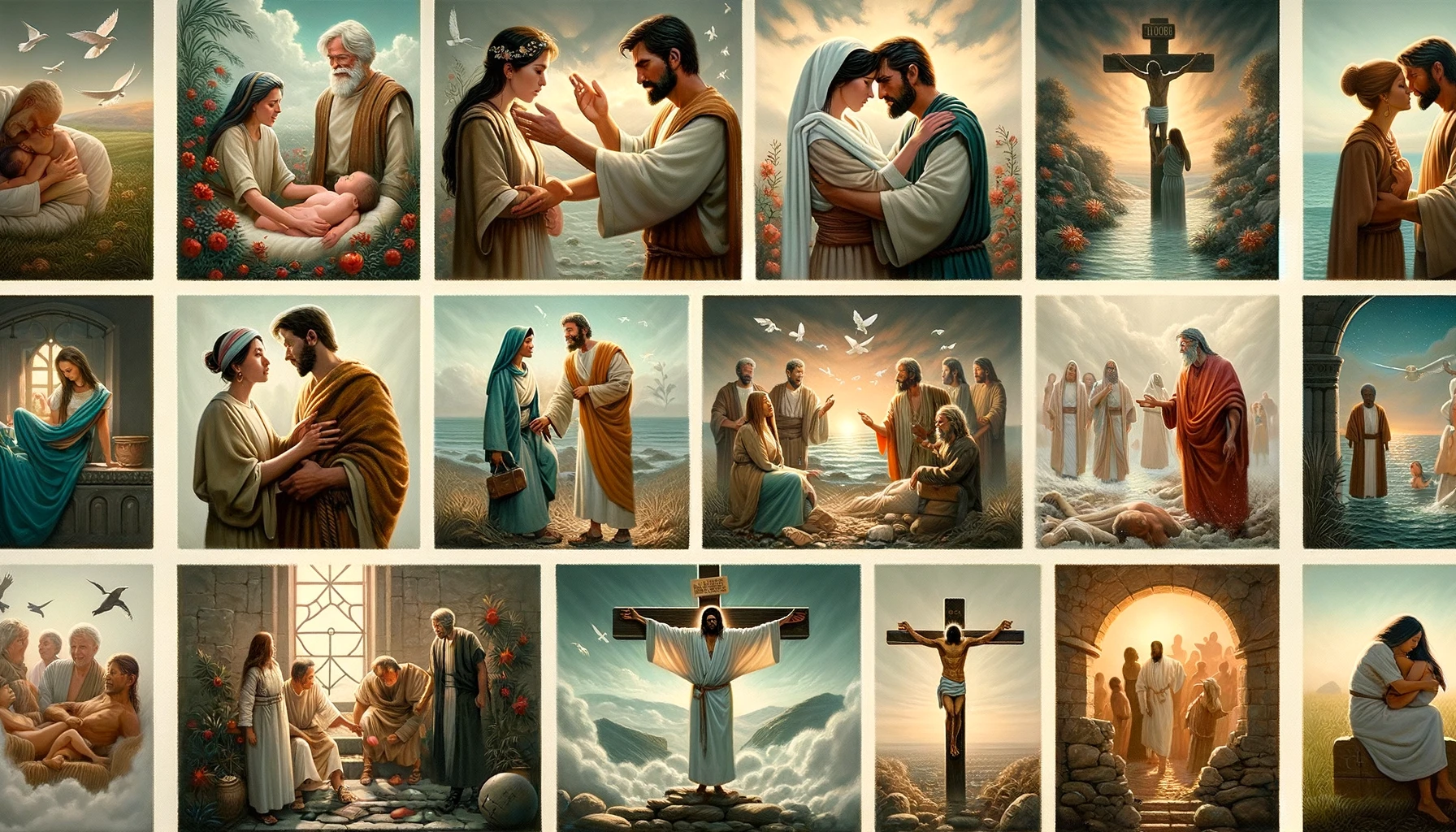Table of Contents
Have you ever wondered how love can conquer even the toughest challenges?
Throughout history, there have been incredible moments of love that inspire and uplift us, reminding us of the power of love in the face of adversity. From ancient tales to modern times, these stories of love will touch your heart and make you reflect on the strength and resilience of the human spirit.
Join us on a journey as we explore these timeless tales of love and discover the inspiration they hold. From unwavering devotion to forgiveness and compassion, these stories remind us that love knows no boundaries and can triumph over the darkest of times.
Are you ready to be inspired? Let’s delve into these remarkable moments of love that have shaped our history and continue to inspire us today. Together, let’s unlock the power of love and conquer any challenge that comes our way.
Make Sure You Watch The Video: I would love for you to subscribe to my YouTube channel as well… Thanks in advance!!
The Story of Ruth and Naomi: Ruth’s Unwavering Devotion
In the realm of unwavering devotion and loyalty, few stories stand as a testament to the power of commitment like that of Ruth and Naomi. This classic tale of love in adversity showcases the resilience and strength found in the face of loss and hardship.
Ruth, a Moabite woman, found herself in a world of uncertainty after her husband’s death. With no ties left, she chose to accompany her mother-in-law, Naomi, back to Bethlehem. This decision marked the beginning of a remarkable journey marked by unwavering devotion and sacrifice.
In the midst of their circumstances, Ruth remained committed to Naomi, refusing to leave her side. She uttered the famous words, often spoken at weddings: “Where you go, I will go; where you stay, I will stay; your people will be my people, and your God my God.” These words encapsulate the depth of Ruth’s loyalty and the profound impact it would have on both their lives.
“Do not urge me to leave you or to return from following you. For where you go I will go, and where you lodge I will lodge. Your people shall be my people, and your God my God. Where you die I will die, and there will I be buried. May the LORD do so to me and more also if anything but death parts me from you.” – Ruth 1:16-17
Ruth’s unwavering devotion to Naomi led her to glean in the fields of Boaz. It was there that Boaz, a wealthy landowner, noticed Ruth’s humility and kindness. Impressed by her character, he extended his protection and care towards her. And so, their paths crossed, leading to a love story that would forever be remembered for its profound impact.
Ruth’s commitment to Naomi and her willingness to embrace a life of uncertainty embody the virtues of love, loyalty, and selflessness. Her story serves as a timeless reminder of the power of unwavering devotion and its ability to transform lives amidst the darkest of times.
Ruth and Naomi’s Journey
| Events | Locations | Significance |
|---|---|---|
| Ruth’s decision to accompany Naomi | Moab to Bethlehem | Symbolizes Ruth’s commitment and loyalty |
| Ruth’s dedication to gleaning in the fields | Boaz’s fields in Bethlehem | Leads to the providential meeting with Boaz |
| Ruth and Boaz’s eventual marriage | Bethlehem | Demonstrates the power of love and faithfulness |
Joseph Forgiving His Brothers: Embracing Love and Forgiveness
Learn about Joseph, who forgave his brothers despite being sold into slavery by them. His act of forgiveness and embrace during a famine teaches us about the strength of forgiveness and reconciliation.
Joseph’s story is a powerful testament to the transformative power of forgiveness. Sold into slavery by his own brothers out of jealousy, Joseph faced countless hardships and trials. However, through his unwavering faith and relentless pursuit of righteousness, Joseph rose to become a powerful figure in Egypt, second in command only to Pharaoh himself.
But it was during a severe famine that Joseph’s true strength shone through. Despite encountering his brothers again, who were now in desperate need of assistance, Joseph harbored no resentment or anger. Instead, he chose to forgive and embrace them, offering not only material aid but also emotional and spiritual reconciliation.
Joseph’s act of forgiveness was not only a demonstration of his magnanimity, but it also symbolized the power of forgiveness to heal deep wounds and restore broken relationships.
It is a testament to the profound impact forgiveness can have on our lives and the lives of others, transcending the pain of the past and paving the way for growth and reconciliation.
The Strength of Forgiveness and Reconciliation
Joseph’s forgiveness of his brothers teaches us valuable lessons about the strength and importance of forgiveness and reconciliation. Despite the betrayal and the years of suffering, Joseph exemplified the capacity to let go of past grievances and embrace love, harmony, and unity.
His actions remind us that forgiveness is not a sign of weakness but rather a testament to our ability to rise above our circumstances and choose love over resentment.
“Forgiveness is not an occasional act; it is a constant attitude.” – Martin Luther King Jr.
Indeed, forgiveness has the power to break the chains of resentment and bitterness, freeing both the forgiver and the forgiven from the shackles of the past. It allows us to build bridges, restore trust, and cultivate compassion and empathy for one another.
Just as Joseph’s forgiveness brought about redemption and ultimately saved his family from the ravages of the famine, our acts of forgiveness have the potential to ripple through generations, creating a legacy of love and reconciliation.
The story of Joseph forgiving his brothers serves as a timeless reminder that forgiveness is a choice we can make, regardless of the circumstances.
It demonstrates the incredible strength and resilience that forgiveness brings, allowing us to heal from the wounds of the past, mend fractured relationships, and cultivate a future filled with love and understanding.

Embracing Forgiveness in Our Lives
Joseph’s story urges us to reflect on our own lives and the relationships that may be marred by pain, betrayal, or misunderstanding. It encourages us to examine our hearts and consider the transformative power of forgiveness in our own journeys.
By choosing to forgive, we can break the cycle of hurt and division, cultivating a culture of compassion, unity, and healing. It allows us to repair fractured bonds, rebuild trust, and create the foundation for stronger and more resilient relationships. Furthermore, forgiveness enables us to experience personal growth, liberation from pain, and inner peace.
In a world often characterized by conflict and discord, the story of Joseph forgiving his brothers offers a beacon of hope. It reminds us of the immense power of love and forgiveness to transcend even the most unimaginable circumstances. Let us embrace the lessons from Joseph’s story and strive to cultivate a life characterized by forgiveness, reconciliation, and unwavering love.
Jesus’ Compassion for the Woman Caught in Adultery: Love Over Condemnation
Let’s delve into a powerful story that exemplifies Jesus’ compassion and highlights the importance of displaying love, even in the face of wrongdoing. In this narrative, a woman caught in adultery is brought before Jesus, with her accusers ready to condemn her.
“Let any one of you who is without sin be the first to throw a stone at her.”
These empathetic and wise words from Jesus challenge the accusers to reflect on their own shortcomings and sins before passing judgment. His response showcases not only kindness and understanding but also serves as a reminder of the fallibility of humanity.
Jesus refuses to condemn the woman, choosing instead to show her compassion and forgiveness.
“Woman, where are they? Has no one condemned you?”
When the woman responds that no one has condemned her, Jesus extends his mercy and encourages her to make a change:
“Neither do I condemn you. Go now and leave your life of sin.”
This powerful moment highlights Jesus’ unwavering display of love, teaching us to prioritize compassion and understanding over condemnation. It emphasizes his understanding of human weaknesses and his desire for individuals to learn, grow, and repent from their mistakes.
Let us not forget the significance of Jesus’ actions in this story. His compassion for the woman caught in adultery serves as a profound example of the transformative power of love and forgiveness in the face of sin. It encourages us to show kindness, empathy, and understanding to others, recognizing that we are all imperfect and in need of redemption.
| Key Points | Takeaways |
|---|---|
| Jesus displays compassion and understanding towards a woman caught in adultery. | Love and forgiveness should prevail over condemnation and judgment. |
| Jesus challenges the accusers to reflect on their own sins before passing judgment. | We should examine our own shortcomings and display empathy towards others. |
| Jesus encourages the woman to leave her life of sin and embrace a path of change. | We should be willing to forgive and support others on their journey of transformation. |
As we reflect on this story, it reminds us to approach situations with love, compassion, and understanding rather than condemnation. Jesus’ example teaches us the transformative power of empathy and forgiveness.
The Good Samaritan: Love Beyond Differences
Uncover the parable of the Good Samaritan, who helped a stranger despite their cultural differences. This story challenges us to show love and kindness to everyone, irrespective of race, religion, or background.
The Good Samaritan is a powerful example of compassion and selflessness. In this parable, a man is robbed, beaten, and left on the road to die. Several individuals pass by, including a priest and a Levite, but they choose to ignore the wounded man. However, a Samaritan, a person from a different cultural and ethnic background, stops to help him. He tends to his wounds, provides him with shelter, and even covers his expenses.
This story teaches us that love knows no boundaries. It transcends cultural differences and highlights the importance of helping others in need. The Good Samaritan’s actions demonstrate that kindness and compassion should be extended to everyone, regardless of our differences. By treating others with love and respect, we create a world where everyone feels valued and supported.
“Love your neighbor as yourself.”
In today’s diverse and interconnected world, it is crucial to embrace the lessons from the Good Samaritan’s parable. By challenging our biases and preconceptions, we can foster understanding, empathy, and unity. Let us remember that acts of kindness have the power to build bridges, bridge divides, and create a more harmonious society.
Examples of Love Beyond Differences
- A Syrian refugee family finding refuge in a neighboring country, where the locals provide them with shelter, support, and resources.
- A multinational corporation implementing inclusive hiring practices, prioritizing diversity and recognizing the value of different perspectives.
- Communities coming together to support victims of natural disasters, regardless of their nationality or ethnic background, providing relief and assistance in their time of need.

| Acts of Love and Kindness | Cultural Differences |
|---|---|
| A stranger helping an elderly person across the street | Displaying respect and empathy towards someone from a different cultural background |
| Volunteering at a local shelter to assist those experiencing homelessness | Recognizing the humanity in individuals from diverse ethnicities and social backgrounds |
| Supporting local businesses owned by minority communities | Breaking down barriers by promoting economic empowerment and inclusivity |
Paul’s Letter to the Corinthians: Embodying Enduring Love
Paul’s first letter to the Corinthians is a profound reflection on the characteristics of love. In this letter, Paul eloquently describes love as a force that endures, remains patient, and exhibits selflessness despite challenging circumstances. His words inspire us to embody these qualities of love, especially during times of adversity.
“Love is patient, love is kind. It does not envy, it does not boast, it is not proud. It does not dishonor others, it is not self-seeking, it is not easily angered, it keeps no record of wrongs. Love does not delight in evil but rejoices with the truth. It always protects, always trusts, always hopes, always perseveres.” (1 Corinthians 13:4-7)
Paul’s letter emphasizes the enduring nature of love, highlighting its ability to withstand the tests of time and tribulations. Love’s endurance allows us to remain steadfast in our relationships and commitments, even when faced with challenges.
Furthermore, Paul emphasizes the importance of patience in love. Patience enables us to show understanding, empathy, and forgiveness towards others, fostering healthy and lasting connections.
Selflessness is another key characteristic of love that Paul emphasizes. True love is marked by a genuine concern for others, placing their needs above our own. It involves acts of kindness, sacrifice, and giving without expectation of anything in return.
When we embody the enduring love described by Paul, we create a nurturing environment for our relationships to thrive. Love’s endurance, patience, and selflessness foster deeper connections and promote harmony among individuals.

Jesus’ Crucifixion and Resurrection: Love Triumphs Over Death
Witness the ultimate act of love as Jesus willingly sacrifices himself for the redemption of humanity. Despite enduring unimaginable pain and suffering, his love triumphs over death, offering hope and salvation to all.
Jesus’ crucifixion and resurrection marks a pivotal moment in history, signifying his profound sacrifice and unwavering love for humanity. By voluntarily accepting crucifixion, Jesus bore the weight of our sins, ultimately paving the way for redemption and eternal salvation.

Jesus’ crucifixion was an act of unparalleled sacrifice. He endured unimaginable physical pain and emotional anguish, humbly embracing the cross to demonstrate the depth of his love for humanity. Through this act, Jesus offers redemption to all who believe in him, cleansing them of their sins and granting them the gift of eternal life.
The crucifixion represents the culmination of Jesus’ earthly ministry, solidifying his message of compassion, forgiveness, and salvation. By willingly sacrificing himself, Jesus exemplified the immense power of sacrificial love, serving as an eternal symbol of hope, grace, and redemption.
Three days after Jesus’ crucifixion, the miracle of his resurrection occurred. Rising from the dead, Jesus conquered death, imparting an everlasting sense of hope and triumph over darkness. His resurrection serves as a testament to God’s power and love, igniting a profound sense of joy and transformation among believers.
For Christians, Jesus’ crucifixion and resurrection form the cornerstone of their faith, reminding them of God’s ultimate sacrifice and the promise of eternal life. It is a time of reflection, gratitude, and renewed hope as believers celebrate the triumph of love over death.
| Keywords | Definitions |
|---|---|
| Sacrifice | The act of giving up something for a greater purpose or cause. |
| Redemption | The process of being saved or delivered from sin or evil. |
| Hope | A feeling of expectation and desire for something positive or better to happen in the future. |
| Salvation | Deliverance from sin and its consequences, resulting in eternal life. |
Jesus’ crucifixion and resurrection embody the greatest act of love, sacrifice, and redemption. It offers hope and salvation to all who believe, reminding us of the transformative power of love that triumphs over death.
Esther’s Courageous Stand: Bravery and Selflessness in the Face of Adversity
Esther’s courageous stand is a testament to the incredible bravery and selflessness she displayed in the darkest of times. Risking her life, Esther stepped forward to save her people from annihilation. In the Persian Empire, King Xerxes had issued a decree to eliminate all Jews. Despite the potential consequences, Esther chose to confront the king and plead for her people’s lives.
“Go, gather together all the Jews who are in Susa, and fast for me. Do not eat or drink for three days, night or day. I and my attendants will fast as you do. When this is done, I will go to the king, even though it is against the law. And if I perish, I perish.” – Esther 4:16
Esther’s remarkable act of bravery stemmed from her selflessness and unwavering devotion to her people. She understood the risk she was taking, but her love for her community propelled her forward. By challenging the king’s decree, Esther demonstrated the power of love and the lengths one can go to protect others.
Esther’s courageous stand serves as an inspiration for all of us to confront adversity and fight for what is right, even when faced with seemingly insurmountable odds. Her story reminds us that love and selflessness can prevail, even in the darkest moments.

The Story of Esther and King Xerxes
To truly understand the magnitude of Esther’s courageous stand, let’s delve into the story of Esther and King Xerxes. Esther, a Jewish orphan, became Queen of Persia after catching the eye of King Xerxes during a beauty contest. Unbeknownst to the king, Esther was of Jewish descent.
When the wicked Haman plotted to annihilate the Jewish people, Esther’s cousin Mordecai urged her to approach the king and intercede on behalf of her fellow Jews. However, approaching the king without an invitation was risky, as it could result in immediate death.
Driven by her love for her people and her commitment to do what was right, Esther devised a plan. She held a series of banquets for the king and Haman, skillfully revealing Haman’s true intentions and pleading for her people’s lives.
Through her courage and tenacity, Esther successfully convinced the king to reverse the decree, saving the Jewish people from destruction. Her bold actions and unwavering faith serve as a timeless example of bravery and selflessness.
The Legacy of Esther’s Courageous Stand
Esther’s courageous stand continues to inspire individuals to this day. Her story reminds us that, in the face of adversity, we have the power to make a difference. Esther’s selfless act of standing up for her people teaches us the importance of fighting for justice and protecting those who are vulnerable.
In a world that often values conformity and self-preservation, Esther’s bravery encourages us to take risks for the sake of others. Her story serves as a reminder that love and selflessness can overcome even the darkest of times.
How Can Love Prevail in the Midst of Adversity and Hate?
In times of adversity and hate, balancing emotions with love and hate is crucial. It’s about choosing to respond with understanding and compassion, even when faced with conflict. By nurturing love and empathy, we can overcome hate and adversity, and create a more harmonious world.
The Healing of the Blind Man: Love’s Power to Bring Light in Darkness
Experience the profound miracle of Jesus healing a blind man, a display of his immense love and compassion for those who are suffering. This awe-inspiring event serves as a reminder that love possesses the remarkable power to illuminate even the darkest corners of our lives, offering hope, healing, and restoration.
Imagine the blind man’s world, a never-ending darkness that enveloped him, preventing him from fully experiencing life’s beauty. In his anguish, he must have cried out for mercy, yearning for a glimpse of light amidst the shadows of his existence. It was in this desperate state that Jesus, moved by love and compassion, reached out and touched the blind man, performing an astonishing miracle.
In an instant, the blind man’s eyes were opened, and a world of colors, shapes, and faces burst into view. The sheer magnitude of this miraculous restoration is beyond comprehension. Through his act of love, Jesus not only restored the blind man’s physical sight but also granted him an opportunity to fully participate in the world, free from the shackles of darkness.
This profound moment encapsulates the transformative power of love and compassion. Jesus’s actions remind us that in the face of suffering and despair, love has the ability to bring about miracles, to heal the deepest wounds, and to ignite a spark of hope within us. Love serves as a guiding light, shining through the darkness and offering solace, comfort, and restoration to those in need.






